人教版(2019)选择性必修第二册Unit 4 Journey across a Vast Land 现在分词与过去分词的区别课件(共27张PPT)
文档属性
| 名称 | 人教版(2019)选择性必修第二册Unit 4 Journey across a Vast Land 现在分词与过去分词的区别课件(共27张PPT) | 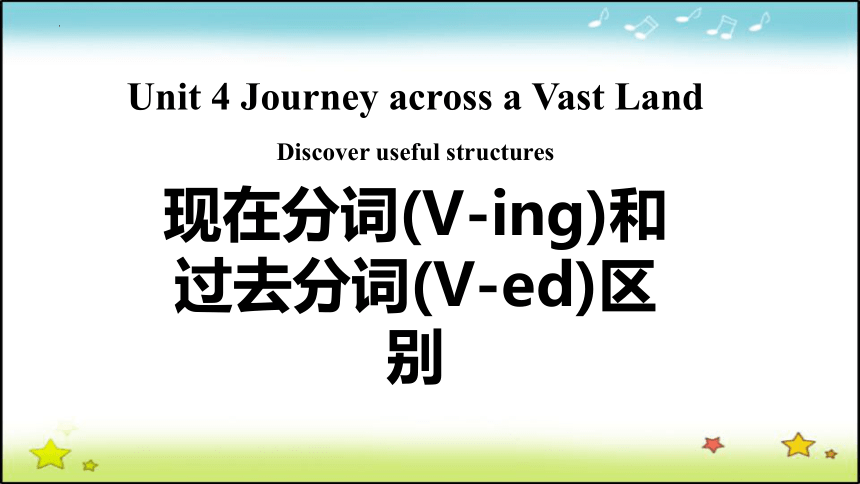 | |
| 格式 | pptx | ||
| 文件大小 | 3.4MB | ||
| 资源类型 | 教案 | ||
| 版本资源 | 人教版(2019) | ||
| 科目 | 英语 | ||
| 更新时间 | 2024-02-24 02:07:59 | ||
图片预览

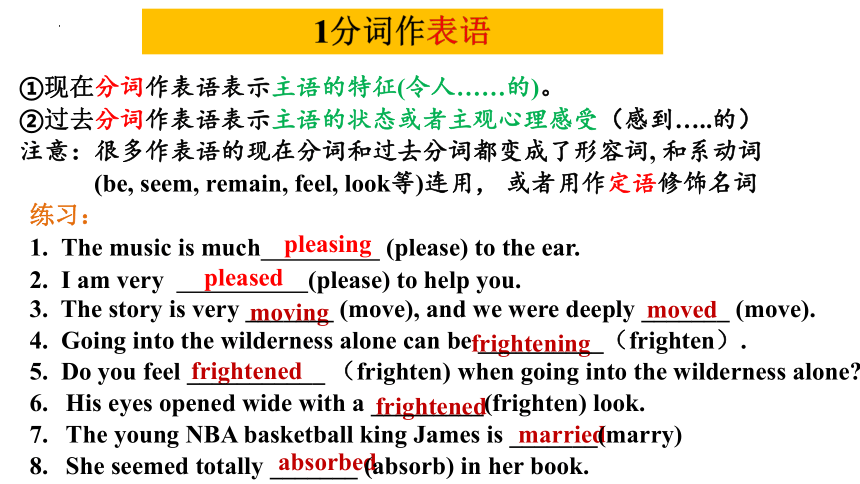
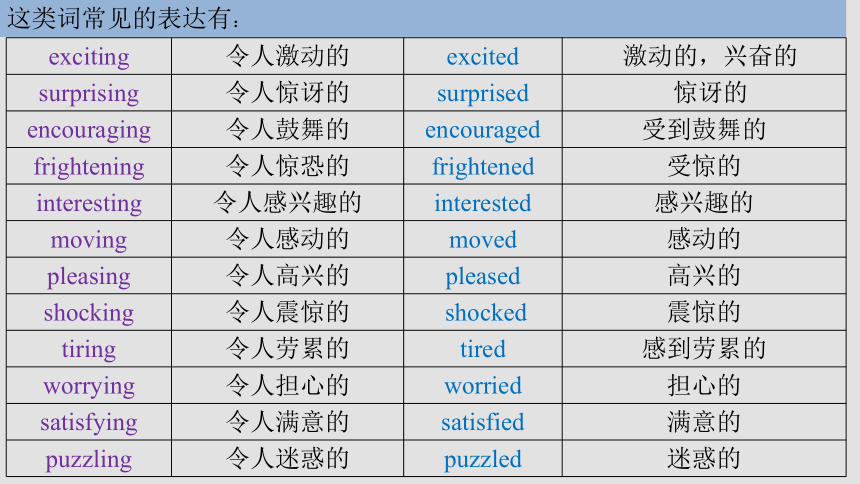
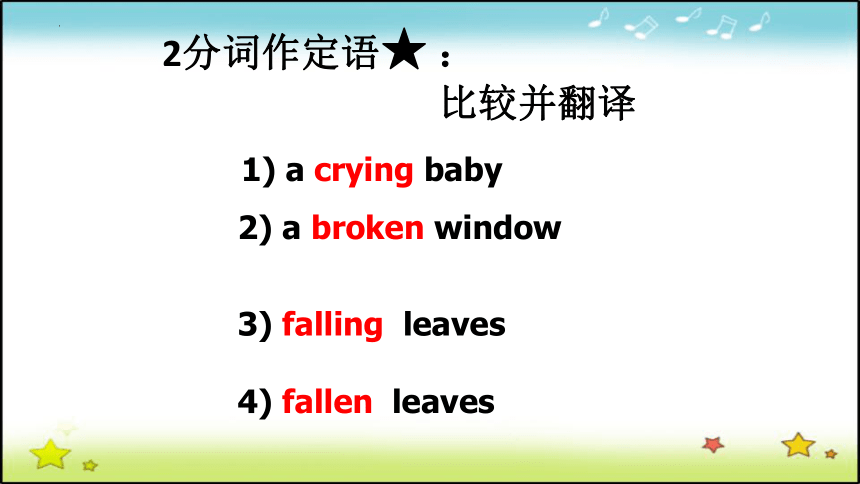
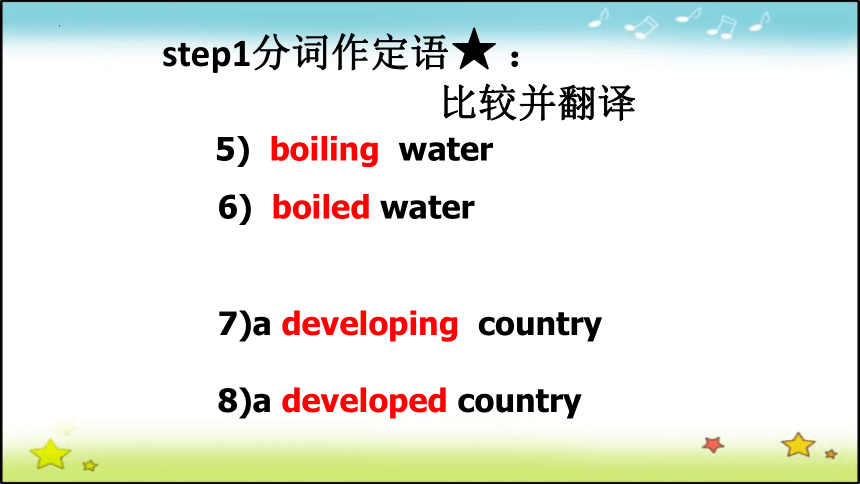
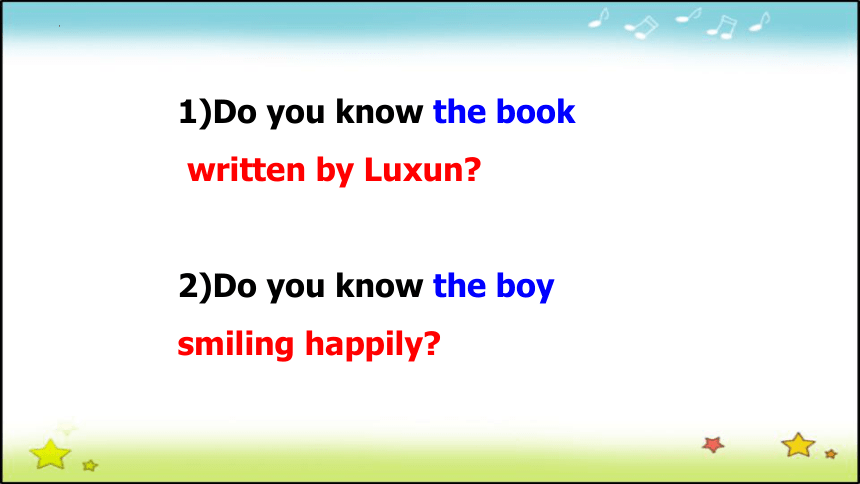
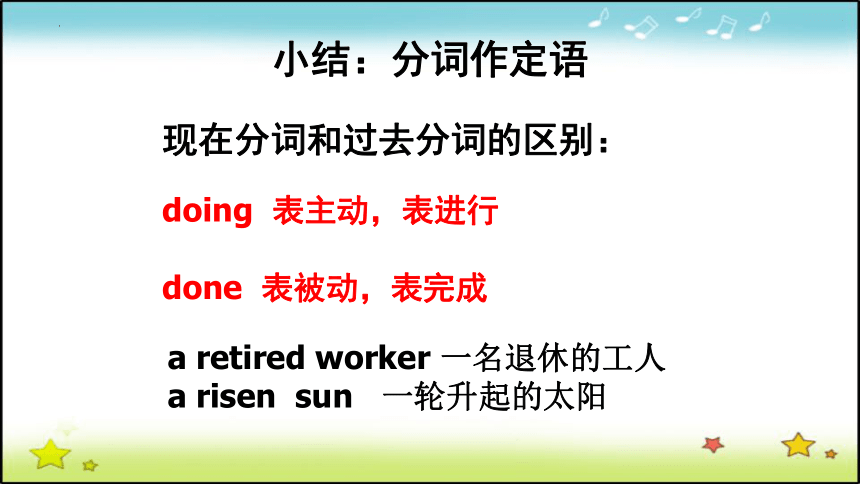
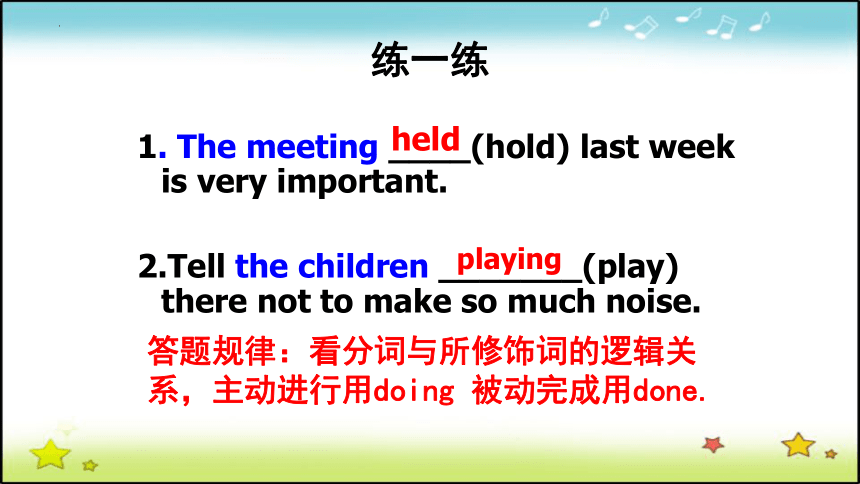
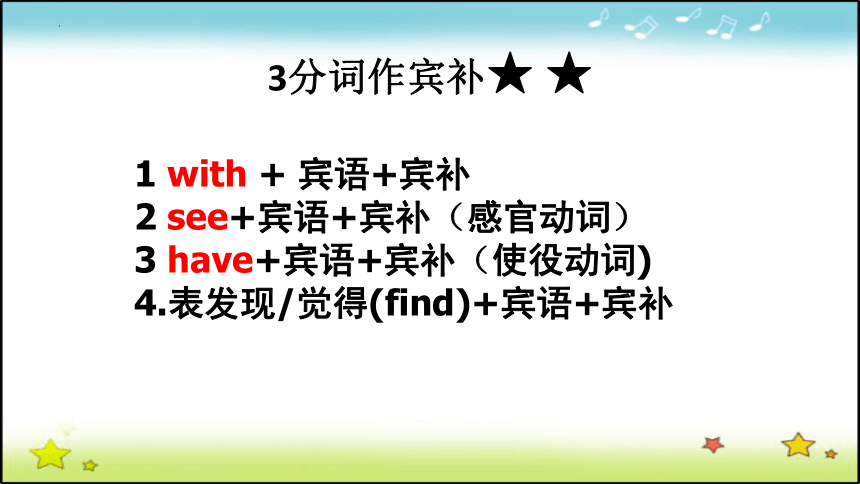
文档简介
(共27张PPT)
Unit 4 Journey across a Vast Land
Discover useful structures
现在分词(V-ing)和过去分词(V-ed)区别
1分词作表语
①现在分词作表语表示主语的特征(令人……的)。
②过去分词作表语表示主语的状态或者主观心理感受(感到…..的)
注意:很多作表语的现在分词和过去分词都变成了形容词, 和系动词
(be, seem, remain, feel, look等)连用, 或者用作定语修饰名词
moving
frightened
frightening
moved
frightened
married
absorbed
pleased
pleasing
3. The story is very _______ (move), and we were deeply _______ (move).
4. Going into the wilderness alone can be __________(frighten).
5. Do you feel ___________ (frighten) when going into the wilderness alone
His eyes opened wide with a _________(frighten) look.
The young NBA basketball king James is _______(marry)
She seemed totally _______ (absorb) in her book.
练习:
1. The music is much (please) to the ear.
2. I am very (please) to help you.
exciting 令人激动的 excited 激动的,兴奋的
surprising 令人惊讶的 surprised 惊讶的
encouraging 令人鼓舞的 encouraged 受到鼓舞的
frightening 令人惊恐的 frightened 受惊的
interesting 令人感兴趣的 interested 感兴趣的
moving 令人感动的 moved 感动的
pleasing 令人高兴的 pleased 高兴的
shocking 令人震惊的 shocked 震惊的
tiring 令人劳累的 tired 感到劳累的
worrying 令人担心的 worried 担心的
satisfying 令人满意的 satisfied 满意的
puzzling 令人迷惑的 puzzled 迷惑的
这类词常见的表达有:
2分词作定语★ :
比较并翻译
1) a crying baby
2) a broken window
3) falling leaves
4) fallen leaves
5) boiling water
6) boiled water
7)a developing country
8)a developed country
step1分词作定语★ :
比较并翻译
1)Do you know the book
written by Luxun
2)Do you know the boy
smiling happily
小结:分词作定语
现在分词和过去分词的区别:
doing 表主动,表进行
done 表被动,表完成
a retired worker 一名退休的工人
a risen sun 一轮升起的太阳
练一练
1. The meeting ____(hold) last week is very important.
2.Tell the children _______(play) there not to make so much noise.
held
playing
答题规律:看分词与所修饰词的逻辑关系,主动进行用doing 被动完成用done.
3分词作宾补★ ★
1 with + 宾语+宾补
2 see+宾语+宾补(感官动词)
3 have+宾语+宾补(使役动词)
4.表发现/觉得(find)+宾语+宾补
Step2讨论并总结
1.With time ____(go)by , great changes have taken place in China.
2. With all the things ____(solve) , She went home happily.
3. I had my hair ____(cut) yesterday.
4. The girl had me____ (wait) for two hours.
5. When I opend the door, I found the ground ____ (cover) by fallen leaves.
6.He saw a boy ____ (get)on the bus.
solved
covered
going
cut
getting
waiting
Step2讨论并总结
1.With time ____(go)by , great changes have taken place in China.
2. With all the things ____(solve) , She went home happily.
3. I had my hair ____(cut) yesterday.
4. The girl had me____ (wait) for two hours.
5. When I opend the door, I found the ground ____ (cover) by fallen leaves.
6.He saw a boy ____ (get)on the bus.
solved
covered
going
cut
getting
waiting
Step2分词作宾补
1 with + 宾语+宾补
2 see+宾语+宾补(感官动词)
3 have+宾语+宾补(使役动词)
4.表发现/觉得(find)+宾语+宾补
答题规律:
分词作宾补取决于分词和宾语的关系
主动用doing,被动用done
4分词作状语
分词作状语,构成现在分词的动词与句子主语之间是逻辑上的 关系,即表 。
主谓
主动
构成过去分词的动词与句子主语之间是逻辑上的 ___ 关系,即表 。
动宾
被动
分词作状语的本质:状语从句的省略 (主语和be动词)
e.g.
1. Scared of the tiger, the girl didn’t dare to sleep alone.
(= Because/As she was scared, the girl didn’t dare to sleep alone.)
2. When heated, water can be changed into vapor.
加热时,水可以变成蒸汽。
=When it is heated, water can be changed into vapor.
省略了主语和be动词
【特别提醒】
①分词作状语,它的逻辑主语要与句子的主语相一致。
If caught, the police will punish the robber.(×)
If caught, the robber will be punished by the police.(√)
②分词做状语,相应的连词可不省略 (常考的when, while, if, once, unless)
When __________(walk) along the street in the evening, the young lawyer saw her former teacher.
walking
独立主格结构
过去分词(短语)作状语时,过去分词(短语)的逻辑主语通常是句子的主语,否则,分词(短语)前应加上自己的主语。这种带有自身主语的过去分词(短语)被称为过去分词(短语)的独立主格结构。过去分词(短语)的独立主格结构通常在句中作状语,可表示时间、原因、条件等。
>The test (finish),we began our holiday.
>The boy lay on his back,his hands (cross)under his head.
>Much time (spend) sitting at a desk,office workers are generally troubled by health problems.
>The man lay there, his hands . (tremble)
finished
crossed
spent
trembling
1. ___________ (hear) the news, she burst into tears. ?
2. _________ (write) in a hurry, this article was not so good.
3. _______ (see) from the hill, the city is beautiful.
4. Tsinghua University, _______(found) in 1911, is home to a great number of outstanding figures.
5. _______________ (complete) the project in time, the staff were working at weekends.
6. He hurried to the station only ________ (find) the train had gone.
基础练习
Hearing
to find
Seen
founded
To complete
Written
1. _______ (lose) in thought, he almost ran into a post.
2. _________ (absorb) in this book, Lily forgot to eat.
3. _______ (face) with the tough situation, he was at a loss.
4. _______ (face) the tough situation, he was panic.
部分过去分词来源于系表结构,作状语时不表示“被动关系”,其前不用being。这样的过去分词及短语常见的有:lost in(陷入某种状态)、seated(坐着的)、hidden(躲着)、lost/absorbed(沉溺于)、dressed in(穿着)、tired of(厌烦了)等。
进阶练习---易混点1
Lost
Absorbed
Faced
Facing
1. ________ (give) that he has worked for a whole day, he deserves to have a rest.
2. ____________ (consider) the situation, he decided to tell the truth.
3. Frankly _________(speak), I do love him.
进阶练习---易混点2
Given
Considering
speaking
有些分词或不定式短语作状语,其形式的选择不受上下文的影响,称作独立成分。常见的有:
独立成分 含义
Generally speaking 一般来说
Frankly/ honestly speaking 坦白地/老实说
Judging from/ by... 根据...来判断
Considering.../ taking...into consideration/ account 考虑到...
To tell you the truth, 说实话
Seeing... 考虑到....
Supposing/ suppose (that) 假如...
Provided/ providing (that)... 假如...
Given... 考虑到....
Assuming... 假使...
Compared to/with 与...相比
进阶练习---易混点2
doing 和 having done 的区别
Doing表示 非谓语动词和谓语动词同时发生,或者非谓语动词后于谓语动词发生
Having done 强调非谓语动词先于谓语动词发生
1. Hearing the news, she rushed out, ______ the book lying open on the table.
A left
B to leave
C leaving
D having left
主动
进阶练习---易混点3
C
doing 和 having done 的区别
Doing表示 非谓语动词和谓语动词同时发生,或者非谓语动词后于谓语动词发生
Having done 强调非谓语动词先于谓语动词发生
2. ______ the address carefully, Tom clicked the button and sent the email to his professor.
A checked
B being checked
C having checked
D to check
主动
进阶练习---易混点3
C
doing 和 having done 的区别
Doing表示 非谓语动词和谓语动词同时发生,或者非谓语动词后于谓语动词发生
Having done 强调非谓语动词先于谓语动词发生
3. ____ her mother after being separated for 20 years, she could not help____
A seen ,crying
B to see ,cry
C seeing , crying
D having seen ,cry
主动
进阶练习---易混点3
C
Thank you!
Unit 4 Journey across a Vast Land
Discover useful structures
现在分词(V-ing)和过去分词(V-ed)区别
1分词作表语
①现在分词作表语表示主语的特征(令人……的)。
②过去分词作表语表示主语的状态或者主观心理感受(感到…..的)
注意:很多作表语的现在分词和过去分词都变成了形容词, 和系动词
(be, seem, remain, feel, look等)连用, 或者用作定语修饰名词
moving
frightened
frightening
moved
frightened
married
absorbed
pleased
pleasing
3. The story is very _______ (move), and we were deeply _______ (move).
4. Going into the wilderness alone can be __________(frighten).
5. Do you feel ___________ (frighten) when going into the wilderness alone
His eyes opened wide with a _________(frighten) look.
The young NBA basketball king James is _______(marry)
She seemed totally _______ (absorb) in her book.
练习:
1. The music is much (please) to the ear.
2. I am very (please) to help you.
exciting 令人激动的 excited 激动的,兴奋的
surprising 令人惊讶的 surprised 惊讶的
encouraging 令人鼓舞的 encouraged 受到鼓舞的
frightening 令人惊恐的 frightened 受惊的
interesting 令人感兴趣的 interested 感兴趣的
moving 令人感动的 moved 感动的
pleasing 令人高兴的 pleased 高兴的
shocking 令人震惊的 shocked 震惊的
tiring 令人劳累的 tired 感到劳累的
worrying 令人担心的 worried 担心的
satisfying 令人满意的 satisfied 满意的
puzzling 令人迷惑的 puzzled 迷惑的
这类词常见的表达有:
2分词作定语★ :
比较并翻译
1) a crying baby
2) a broken window
3) falling leaves
4) fallen leaves
5) boiling water
6) boiled water
7)a developing country
8)a developed country
step1分词作定语★ :
比较并翻译
1)Do you know the book
written by Luxun
2)Do you know the boy
smiling happily
小结:分词作定语
现在分词和过去分词的区别:
doing 表主动,表进行
done 表被动,表完成
a retired worker 一名退休的工人
a risen sun 一轮升起的太阳
练一练
1. The meeting ____(hold) last week is very important.
2.Tell the children _______(play) there not to make so much noise.
held
playing
答题规律:看分词与所修饰词的逻辑关系,主动进行用doing 被动完成用done.
3分词作宾补★ ★
1 with + 宾语+宾补
2 see+宾语+宾补(感官动词)
3 have+宾语+宾补(使役动词)
4.表发现/觉得(find)+宾语+宾补
Step2讨论并总结
1.With time ____(go)by , great changes have taken place in China.
2. With all the things ____(solve) , She went home happily.
3. I had my hair ____(cut) yesterday.
4. The girl had me____ (wait) for two hours.
5. When I opend the door, I found the ground ____ (cover) by fallen leaves.
6.He saw a boy ____ (get)on the bus.
solved
covered
going
cut
getting
waiting
Step2讨论并总结
1.With time ____(go)by , great changes have taken place in China.
2. With all the things ____(solve) , She went home happily.
3. I had my hair ____(cut) yesterday.
4. The girl had me____ (wait) for two hours.
5. When I opend the door, I found the ground ____ (cover) by fallen leaves.
6.He saw a boy ____ (get)on the bus.
solved
covered
going
cut
getting
waiting
Step2分词作宾补
1 with + 宾语+宾补
2 see+宾语+宾补(感官动词)
3 have+宾语+宾补(使役动词)
4.表发现/觉得(find)+宾语+宾补
答题规律:
分词作宾补取决于分词和宾语的关系
主动用doing,被动用done
4分词作状语
分词作状语,构成现在分词的动词与句子主语之间是逻辑上的 关系,即表 。
主谓
主动
构成过去分词的动词与句子主语之间是逻辑上的 ___ 关系,即表 。
动宾
被动
分词作状语的本质:状语从句的省略 (主语和be动词)
e.g.
1. Scared of the tiger, the girl didn’t dare to sleep alone.
(= Because/As she was scared, the girl didn’t dare to sleep alone.)
2. When heated, water can be changed into vapor.
加热时,水可以变成蒸汽。
=When it is heated, water can be changed into vapor.
省略了主语和be动词
【特别提醒】
①分词作状语,它的逻辑主语要与句子的主语相一致。
If caught, the police will punish the robber.(×)
If caught, the robber will be punished by the police.(√)
②分词做状语,相应的连词可不省略 (常考的when, while, if, once, unless)
When __________(walk) along the street in the evening, the young lawyer saw her former teacher.
walking
独立主格结构
过去分词(短语)作状语时,过去分词(短语)的逻辑主语通常是句子的主语,否则,分词(短语)前应加上自己的主语。这种带有自身主语的过去分词(短语)被称为过去分词(短语)的独立主格结构。过去分词(短语)的独立主格结构通常在句中作状语,可表示时间、原因、条件等。
>The test (finish),we began our holiday.
>The boy lay on his back,his hands (cross)under his head.
>Much time (spend) sitting at a desk,office workers are generally troubled by health problems.
>The man lay there, his hands . (tremble)
finished
crossed
spent
trembling
1. ___________ (hear) the news, she burst into tears. ?
2. _________ (write) in a hurry, this article was not so good.
3. _______ (see) from the hill, the city is beautiful.
4. Tsinghua University, _______(found) in 1911, is home to a great number of outstanding figures.
5. _______________ (complete) the project in time, the staff were working at weekends.
6. He hurried to the station only ________ (find) the train had gone.
基础练习
Hearing
to find
Seen
founded
To complete
Written
1. _______ (lose) in thought, he almost ran into a post.
2. _________ (absorb) in this book, Lily forgot to eat.
3. _______ (face) with the tough situation, he was at a loss.
4. _______ (face) the tough situation, he was panic.
部分过去分词来源于系表结构,作状语时不表示“被动关系”,其前不用being。这样的过去分词及短语常见的有:lost in(陷入某种状态)、seated(坐着的)、hidden(躲着)、lost/absorbed(沉溺于)、dressed in(穿着)、tired of(厌烦了)等。
进阶练习---易混点1
Lost
Absorbed
Faced
Facing
1. ________ (give) that he has worked for a whole day, he deserves to have a rest.
2. ____________ (consider) the situation, he decided to tell the truth.
3. Frankly _________(speak), I do love him.
进阶练习---易混点2
Given
Considering
speaking
有些分词或不定式短语作状语,其形式的选择不受上下文的影响,称作独立成分。常见的有:
独立成分 含义
Generally speaking 一般来说
Frankly/ honestly speaking 坦白地/老实说
Judging from/ by... 根据...来判断
Considering.../ taking...into consideration/ account 考虑到...
To tell you the truth, 说实话
Seeing... 考虑到....
Supposing/ suppose (that) 假如...
Provided/ providing (that)... 假如...
Given... 考虑到....
Assuming... 假使...
Compared to/with 与...相比
进阶练习---易混点2
doing 和 having done 的区别
Doing表示 非谓语动词和谓语动词同时发生,或者非谓语动词后于谓语动词发生
Having done 强调非谓语动词先于谓语动词发生
1. Hearing the news, she rushed out, ______ the book lying open on the table.
A left
B to leave
C leaving
D having left
主动
进阶练习---易混点3
C
doing 和 having done 的区别
Doing表示 非谓语动词和谓语动词同时发生,或者非谓语动词后于谓语动词发生
Having done 强调非谓语动词先于谓语动词发生
2. ______ the address carefully, Tom clicked the button and sent the email to his professor.
A checked
B being checked
C having checked
D to check
主动
进阶练习---易混点3
C
doing 和 having done 的区别
Doing表示 非谓语动词和谓语动词同时发生,或者非谓语动词后于谓语动词发生
Having done 强调非谓语动词先于谓语动词发生
3. ____ her mother after being separated for 20 years, she could not help____
A seen ,crying
B to see ,cry
C seeing , crying
D having seen ,cry
主动
进阶练习---易混点3
C
Thank you!
